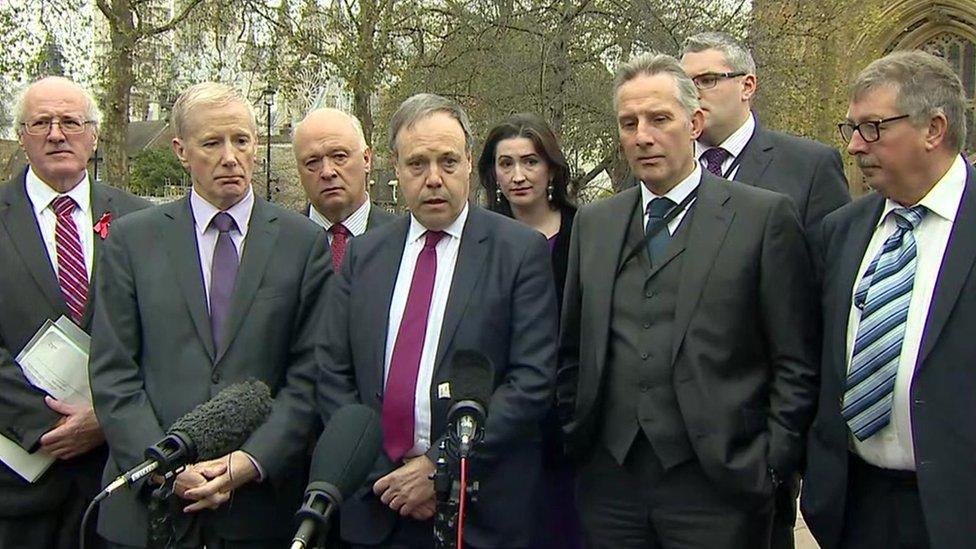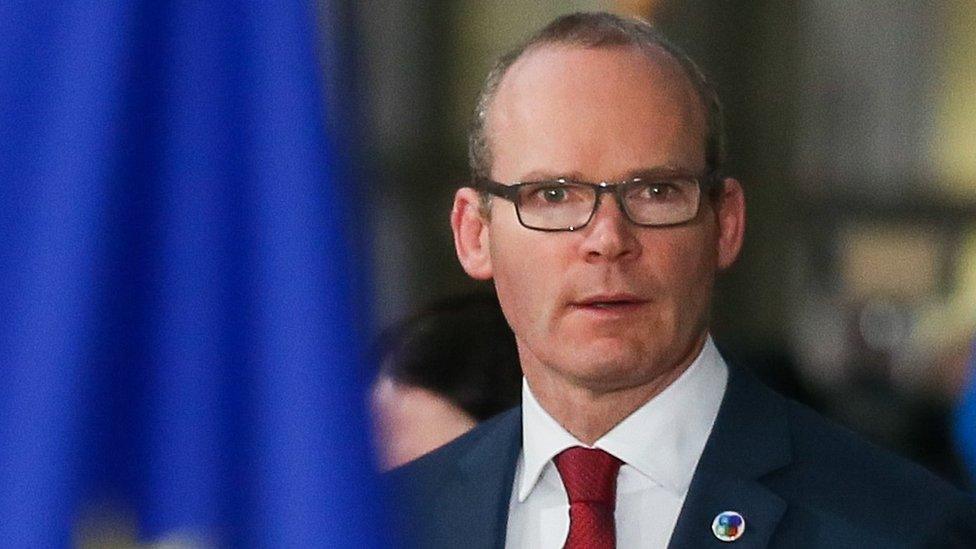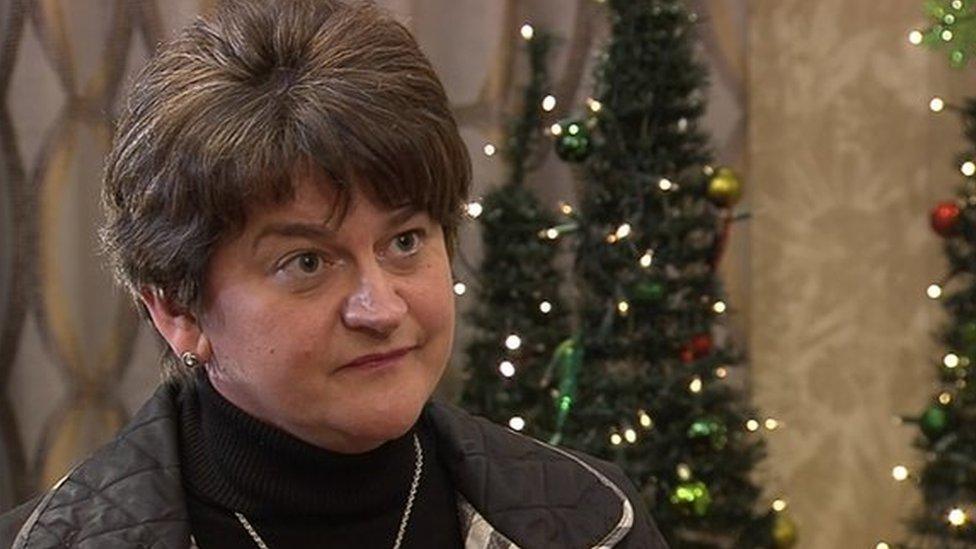Labour attacks 'embarrassing' Brexit talks
- Published
- comments
Labour: May to blame for Brexit 'embarrassment'
Ministers say no part of the UK will be treated differently in the Brexit talks as Labour branded their approach an "embarrassment".
No agreement has been reached with the EU after a DUP backlash against proposals for the Irish border.
Brexit Secretary David Davis told MPs the government was close to concluding the first phase of talks.
DUP leader Arlene Foster said the text of the deal was a "big shock" and "it was not going to be acceptable."
She told the Republic of Ireland national broadcaster RTÉ that her party only saw the text on Monday morning, despite asking to see it for five weeks.
Theresa May, speaking as she welcomed Spanish Prime Minister Mariano Rajoy to Downing Street, said talks with the EU had " made a lot of progress".
"There are still a couple of issues we need to work on. But we'll be reconvening in Brussels later this week as we look ahead to the December European Council," she said.
Mrs Foster was invited to hold talks with Mrs May in London on Tuesday, but the party's Westminster leader met the government's chief whip instead.
The meeting lasted for several hours, but sources suggested to the BBC's political editor Laura Kuenssberg that there was not much sign of a breakthrough yet, with a DUP insider saying the deal needed "radical surgery", rather than a few word changes.
A phone call between Mrs May and Mrs Foster had then been expected this evening, but sources added that it would not go ahead, suggesting it had never been arranged.
Citizens' rights, the Irish border and money are the three big negotiation points
The UK is due to leave the EU in March 2019 and Mrs May is under pressure to reach agreement on the Northern Ireland border so negotiations can move forward.
The prime minister needs the support of the DUP - the Democratic Unionist Party - which is Northern Ireland's largest party and has 10 MPs at Westminster, because she does not have a majority to win votes in the House of Commons.
Responding to an urgent question from Labour in the Commons on Tuesday, Mr Davis defended the controversial proposal for "regulatory alignment" between Northern Ireland and the Republic of Ireland - intended to avoid the need for border checks after Brexit - saying this would apply to the whole of the UK.
The DUP is unhappy about any agreement which treats Northern Ireland differently.
It would not mean "having exactly the same rules" as the EU, Mr Davis said, but would involve "sometimes having mutually recognised rules".
Backbencher Jacob Rees-Mogg warned that having "regulatory divergence" from the EU after Brexit was a "red line".
Davis: We are making Brexit progress
Labour's Brexit spokesman Sir Keir Starmer said that when the DUP objected to the draft agreement, "fantasy met brutal reality", adding: "The DUP tail is wagging the Tory dog."
Mr Starmer also called for the government to drop its plan to enshrine the 29 March 2019 Brexit date in UK law.
Meanwhile, former Tory leader Iain Duncan Smith suggested the UK should walk away from the negotiations if the EU does not change its position.
Iain Duncan Smith: EU needs to 'back off' or 'move on'
But Tory MP and former cabinet minister, Nicky Morgan, said his comments were "madness" and walking away would "betrays the futures of millions of young people and those who never wanted to leave in the first place".
Allow X content?
This article contains content provided by X. We ask for your permission before anything is loaded, as they may be using cookies and other technologies. You may want to read X’s cookie policy, external and privacy policy, external before accepting. To view this content choose ‘accept and continue’.

The DUP has said "it is not a question of us budging" as the talks were between the UK and the EU
Dublin - which as an EU member is part of its single market and customs union - has been calling for written guarantees that a "hard border" involving customs checks on the island of Ireland will be avoided after Brexit
It is concerned this could undermine the 1998 peace treaty - the Good Friday Agreement that brought an end to 30 years of sectarian conflict in Northern Ireland.
Mr Davis said that while the "integrity" of the single market and customs union must be respected after Brexit, it was "equally clear we must respect the integrity of the United Kingdom" and individual nations could not have separate arrangements.
What happened in Brussels
Mrs May needs to show "sufficient progress" has been made so far on "divorce" issues before European leaders meet on 14 December to decide whether to allow talks on future trade relations to begin.
The three issues that need to be resolved are the Northern Ireland border, citizens' rights and the amount of money the UK will pay as it leaves.
Talks between Mrs May and European Commission president Jean-Claude Juncker broke up without agreement on Monday, after the DUP objected to a draft agreement on the future of the Irish border.
Key to the row is how closely aligned Northern Ireland's regulations will be with those of the Republic of Ireland, and the rest of the EU, in order to avoid a "hard" border.
Irish PM Leo Varadkar said he was "surprised and disappointed"
Ireland's deputy prime minister Simon Coveney said Dublin would not budge from its position on the border.
The reaction
The EU is treating the row as a "domestic British political issue", BBC Brussels correspondent Adam Fleming said.
"The show is now in London," said a European Commission spokesman.
Downing Street has insisted the border was not the only outstanding problem and disagreement remains over the role of the European Court of Justice in overseeing EU citizens' rights in the UK after Brexit.
- Published3 December 2017

- Published4 December 2017
- Published5 December 2017
